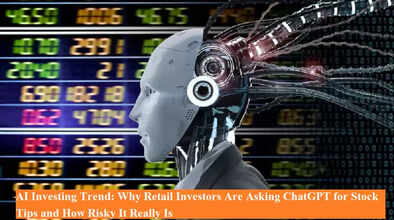AI Investing Trend: Why Retail Investors Are Asking ChatGPT for Stock Tips and How Risky It Really Is

Artificial Intelligence (AI) has quickly made its way into the world of investing. What was once the domain of professional financial advisors and costly research firms is now being explored by everyday retail investors with the help of AI-powered chatbots like ChatGPT. From stock selection to portfolio monitoring, more investors are experimenting with AI tools for financial decisions. But experts warn—while convenient, this trend also comes with serious risks.
ChatGPT and the Rise of Robo-Advisory
OpenAI’s chatbot, ChatGPT, is nearing its third anniversary and has already reshaped how people interact online. Beyond everyday queries, it is now being used by retail investors to ask one of the most crucial financial questions: “Which stock should I buy?”
According to reports, at least one in ten retail investors is using ChatGPT to help choose stocks. This growing reliance has fueled the rapid expansion of the robo-advisory market—a sector where automated, algorithm-driven platforms offer financial advice. Market estimates suggest that the robo-advisory industry could rise from $61.75 billion today to nearly $470.91 billion by 2029.
Still, even enthusiastic users acknowledge that ChatGPT cannot replace certified financial advisors. Unlike dedicated platforms built for financial analytics, general-purpose AI models carry limitations, which may lead to errors in investment strategies.
Real Investor Experiences With AI
Jeremy Leung, who spent nearly two decades at UBS analyzing companies, began using ChatGPT to guide his multi-asset portfolio after leaving the bank. Without access to expensive data services like Bloomberg, Leung found that ChatGPT could still perform valuable functions. However, he cautioned that the chatbot lacks access to critical financial databases hidden behind paywalls, which means its analysis can sometimes miss key insights.
Leung also explained that results depend heavily on the instructions given to the AI. For example, he might tell ChatGPT, “Assume you are a short analyst—provide a short thesis for this stock,” or restrict it to reliable sources such as SEC filings. According to him, the more context investors provide, the better the output.
Survey Shows Growing Trust in AI Tools
A global survey conducted by trading platform eToro among 11,000 retail investors revealed that nearly half are open to using AI tools such as ChatGPT or Google Gemini for portfolio decisions. About 13% said they are already relying on AI for investment choices. In the UK, around 40% reported using AI or chatbots for personal finance advice.
Dan Moczulski, Managing Director at eToro UK, issued a strong caution: “AI models can be impressive, but the risk arises when people treat general models like ChatGPT or Gemini as crystal balls for the future.” He advised that only AI systems specifically designed for financial market analysis should be trusted, since general models may provide outdated, inaccurate, or overly generalized data.
How AI-Selected Stocks Performed
Interestingly, in March 2023, financial comparison platform Finder asked ChatGPT to pick high-quality stocks based on certain filters such as low debt, consistent growth, and strong competitive advantages. The chatbot selected 38 companies including Nvidia, Amazon, Procter & Gamble, and Walmart. Since then, this portfolio has surged nearly 55%, outperforming the average of the UK’s ten most popular funds (Vanguard, Fidelity, HSBC, Fundsmith, etc.) by about 19%.
Risks That Cannot Be Ignored
Despite such promising examples, experts caution that AI investing is not foolproof. U.S. stock markets may be at record highs now, but uncertainties in economic data and policies remain. General-purpose AI tools can fail in periods of crisis, when investor behavior and macroeconomic shocks disrupt standard models.
Leung emphasized that relying solely on AI does not make someone a market expert. “If people are making money using AI right now, it doesn’t mean they can handle a market downturn. Their real test will come during a crisis or recession, when both they and their AI models could fail,” he noted.
Bottom Line for Retail Investors
AI tools like ChatGPT have democratized access to financial insights, making sophisticated analysis available to everyday investors. However, they are not replacements for human expertise. The best approach is to combine AI-powered insights with guidance from certified financial advisors and maintain strict risk management strategies.
While the idea of asking a chatbot for stock advice may seem futuristic, experts stress that successful investing still requires knowledge, caution, and diversification. In short: AI can be a powerful assistant, but it is no substitute for informed decision-making.

